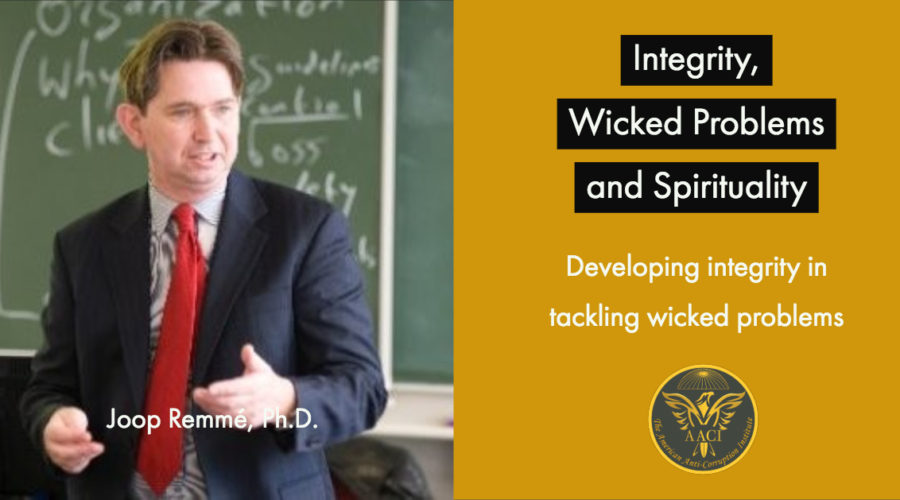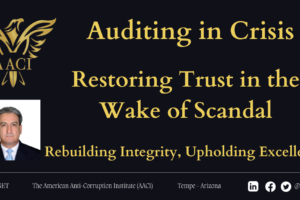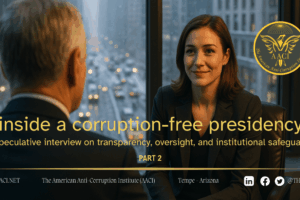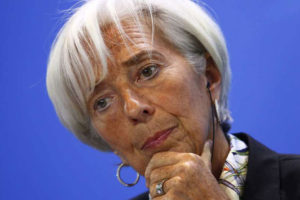Developing integrity in tackling wicked problems

Dr. Remmé is an academic coordinator/ faculty member at Limburg Graduate School of Business, Netherlands. He is a director at The Netherlands Center of Governance (NCG). He is also a lead expert at The American Anti-Corruption Institute (AACI) in the European Union. Dr. Remmé is a renowned expert in governance and anti-corruption. You may reach Dr. Remmé at remme@knowdialogue.nl
Abstract
In this paper, the notion of integrity is regarded from an uncommon perspective. Integrity is usually seen as a characteristic, be it of a person or a social group. Something discernable. In this paper, however, we venture to see it as a “wicked problem”. In other words, instead of the traditional black and while approach to integrity – “it is there or it is not” -, it may be worthwhile to regard integrity as a dynamic. This paper argues that probably integrity is often so elusive that its true nature has been misunderstood. It then offers the option of regarding integrity as a competence to act according to the best reconciliation between corruption and integritism [note] On the notion of “integritism”, see: Huberts (2014). [/note].
Before discussing the complex issue of “integrity”, let us first look at what a “wicked problem” is [note] Camillus (2008). [/note]. Batie[note] Batie (2008). [/note] describes it as a problem that is “dynamically complex, ill-structured and public”. She also calls wicked problems “untamed”. What this means is that there are problems that do not easily fit into a given structure, nor offer structure themselves. Their causes and effects are typically hard to identify, making them rather elusive. They are typically connected with other problems. As a result, those who discuss them come from a variety of perspectives and have a hard time reaching an adequate level of consensus on the content and meaning of the wicked problem at hand. They typically occur in a social context, with their own stakeholder landscape adding to the complexity.
Take the example of “corporate responsibility”. Given how complex a phenomenon the “corporate” is, understanding its responsibilities gives it further complexity. It is also not definitively answered, as corporates continue to operate and incur responsibilities as they go along. It is hard to have a consensus on this wicked problem, as the corporate lawyer, social advocate, union leader and academic, to name only a few, all have their very own, legitimate, perspectives on the matter.
Wicked problems have probably always been part of human reality, through the ages and amidst a huge variety of cultures (we are reminded here of the perspective of Fons Trompenaars, who defines “culture” as a “social context for problem-solving”[note] Trompenaars (1993). [/note]). They may well go back as far as human existence, struggling with the challenges of life, which include the challenges of interhuman behaviour.
That was also the perspective of Aristotle, who wrote a book called “Aporiai”[note]Barnes (1984) II, pages 1319-1527. [/note]. This book is in English called “Problems”. It largely deals with challenges resulting from the human condition, which may be assumed to always occupy human understanding. From his discussion of a whole list of problems we can gather that those problems apparently do not have a definite solution that is valid for all times and situations, Rather, they keep coming back, often showing different sides of themselves.
Most of Aristotle’s books were early on translated into Latin and many of the concepts developed by Aristotle were passed on to later generations in their Latin form[note] The most important example is “ousia”, which was translated into Latin as either “essentia” or “substantia”, which was unfortunate, because the Greek word combined both notions and some of that was lost in the translations. The closest is perhaps “essentia”, as “ousia” originally meant something as “what is constant in the process of being”. The translation into “substantia” eventually led to the notion that reality is made up of “things” – “substances” -, which is not what Aristotle meant. [/note]. Thus, “aporia” became translated into Latin as “problema”, while that is not an adequate translation, because an “aporia” is not just any problem, but a specific kind of problem. It refers to persistent problems that do not have a straightforward solution. He held that there are certain issues (perhaps a better translation than ”problems”) that you can only solve in a limited way, while they keep presenting themselves.
For instance knowledge: how is it possible that we can know something about the reality we find ourselves in? We may have some answers to that (libraries full of them, in fact), but still we keep coming back to that age-old question. This shows another aspect of what an “aporia” is: it is unavoidable. Sticking with the example, we cannot avoid having to think about knowledge, as we realize that knowledge is an important part of how we manage our lives and inter-human conduct.
In modern culture, and especially in the business community in the Western world, a problem is something that you solve [note]A clear example is found in the following presentation: https://www.slideshare.net/DrFereidounDejahang/086-pcda-problemsolving- training?qid=ef3320d0-cae0-4bc7-9b43-d46716aadc0d&v=&b=&from_search=2. [/note]. Many tools have been developed for “problem-solving” and the impression has been raised that given the right tool any problem can be solved. Often people speak in terms of “if you can not solve it, do not waste your time on it”.
From aporia to wicked problem
The modern expression for aporia is “wicked problem”: a problem that is very difficult or perhaps even impossible to solve. But we do feel compelled to struggle with the wicked problem. Maybe because we expect that such a struggle will render side effects we could benefit from, even when a solution as such seems out of reach, or made problematic by unseen consequences. Or, what is even more likely, because the wicked problem addresses something of vital importance to us.
Business
The business world appears reluctant to admit to the existence of wicked problems; at least in the Western world [note]People in cultures like the Chinese, Koreans and Japanese have less of a problem admitting that wicked problems exist; Trompenaars (1993). [/note]. Maybe many managers feel embarrassed to have to admit to something they cannot solve. Maybe something that cannot render a solution is seen by some more as a risk than as an opportunity, especially when they expect the solution to be incomplete or not leading to a useful implementation. At least when we look at what approaches are popular amongst managers and their consultants, you see that wicked problems are ignored, as “lean” and “agile” have come to mean that a problem needs to result in a clear unambiguous decision, which then has to be implemented in the fastest and most efficient manner. No time there for thinking about wicked problems.
Integrity has often been treated as the basis of trust[note]Shaw (1997). [/note]. But apart from that basis, there is no consensus on its meaning. The Oxford dictionary gives two definitions: “The quality of being honest and having strong moral principles.” and “The state of being whole and undivided.”[note]https://en.oxforddictionaries.com/definition/integrity. [/note]. Both appear to have merit. But what if we were to look closer? The issues with the first definition would be that “being honest” might not be precise and clear enough. Does “honesty” mean the same thing all over the world? Probably not. And when we look at the second definition – which connects to the etymological approach: “integer” in Latin means “whole” – we have to ask “whole what?”. We may still be confused.
The just given definitions present the danger that integrity is seen as black and white: you have principles or not. But is that not a distortion of reality?
Integrity as wicked problem
But what if we were to declare “integrity” as a wicked problem? The traditional approach would be: develop a rule or set of rules on what it is and what should be done with it, and then enforce it in line with those rules. That has some merit, but it is rather black and white[note]Roebuck (2016). [/note]. It leads many people to think in terms of “either you have integrity, or you do not”. But is reality really like that?
Often, the “black and white approach” does not suffice. Aristotle had already indicated that “how to act” is an aporia, or wicked problem. There are some rules to be found and Aristotle explains a few (“act in line with proper insight and the virtuous avoidance of extremes”)[note]Aristotle, Nicomacheian Ethics, II, V. [/note], but he also saw that this only goes so far. But what if you are facing a totally new situation? Are you to then follow the rules that were derived from the old situation? We then see that a way forward is not primarily found in following guidelines, but in tackling a problem anew in the new situation in which it presents itself. One needs to understand, however, that the solution has now changed the nature of the problem; and, unless constantly checked against the solution, the “new problem” will morph into something else, where the original solution will not be as effective. This is the non-static nature of problems; when solved, they change.
As is always the case with an aporia or wicked problem, struggling with it is unavoidable. We apparently cannot shrug our shoulders and look the other way. That is because of another characteristic of aporiai, or “wicked problems”: they relate in some way to fundamental aspects of human life that demand our attention whether we like it or not.
Integrity has in its etymological origin the connotation of “being whole”. Aristotle called that the perfect realization of your essence. But why are we concerned with “being whole”. Is it from the guilty feeling that in everyday life we are fragmented or incomplete? If that is the case, or at least what we suspect, then should we not try to understand what makes us “not whole”? Is corruption not a way of “not being whole”, distorting wholeness[note]Etymologically,”corruption” means as much as “rot” (the verb “corrumpere” means ”to rot”). That means that we may be able to understand corruption from studying what it is that is perceived as undergoing “rot”. [/note]?
Many of us work in organisations where we are expected to separate “family life” from “work life”, or work in professional environments that require us to “act professionally” in some situations and not so in other situations. Although this is different in different cultures[note]This becomes apparent in one of the other dimensions discussed by Trompenaars and Hampden-Turner, the dilemma between specific and diffuse cultures; Trompenaars (1993). [/note], it may be the case in some degree wherever we go.
Integrity is particularly plagued by a possible separation between how we think and how we act. Such a separation can be intentional, when someone is willingly trying to deceive someone, but it can also be unintentionally, for instance when we do not realize that the way in which we act can be construed as different from our statements. The effect that those statements loose credibility and the person uttering them is suspected of having an “integrity problem”.
Such separations in our lives are presumably for good reason and perhaps unavoidable. But the consequence of this given is that the separate parts of our lives may have separate, and maybe conflicting, demands on us. Our wholeness is then in danger. Let us now define “integrity” as “being consistent in all acts, including speech-acts, in line with prevailing agreements”, then we recognize the challenge to become and remain “whole”. Not just whole in ourselves, which is hard enough, but also whole with our social context: “prevailing agreements” relates to the deals that we make with our social contexts in order to be a trusted participant in those contexts.
The desire to be “whole” – a concept we encountered when we looked at the definitions of “integrity” – is often associated with spirituality[note]Mitroff/Denton (1999). [/note]. We can say that in general spirituality has as one of its characteristics a profound respect of a reality beyond individual human existence. Maybe we can define spirituality as the effort to connect with such an all-encompassing unifying reality, beyond what we can easily comprehend.
Is that a separate segment in our lives, next to those already mentioned? That would give us an infinite regression (also discussed by Aristotle): in our lives some element tries to unify itself with other elements and then there has to be yet another unifying thing to make that a whole, while it is again separate and then needs yet another unifying element. That does not work, obviously.
It has to be something of a different nature than the elements in our lives; maybe something that gives meaning to those elements as specifically our elements (searching for meaning is yet another classic wicked problem).
This combines with an aspect of virtue that Aquinas – brilliant follower of Aristotle – emphasized: the will. He points out that there is no virtue in accidentally following the right path[note]Aquinas, I Iiae, q.8. [/note], but that virtue lies in finding the right path for you and having the fortitude to walk it, so to speak. We can probably agree with him. Do you find someone dependable who did what he promised, but totally by accident? Probably not. You will probably find someone dependable who, after having made a promise, figures out how to honour it in the best way and then acts on that.
What if we were to regard integrity not as a property, in the sense that a person or a group of people “has” it in some way, but as a virtue. You may say that this does not change much, as a virtue is also something that you “have”. But then we do not think along Aristotelian lines. From that line of thinking, a virtue is something you do. You could say that it is a tendency to act in a way that shows intelligence and the fortitude to act on that.
If integrity is a virtue, then what are the extremes between which it finds its most sensible path, in Aristotelian terms? Surely, one of the extremes would be corruption, which we can define as being persuaded to deviate from the correct execution of duties[note]There are many definitions of corruption, such as the one from Transparency International (“the abuse of entrusted power for private gain”), which seem to fit. But if you use the definition “persuading or being persuaded to deviate from the correct execution of entrusted duties”, you emphasize the two elements of corruption: 1) it involves an illegitimate mode of persuasion, and 2) it damages something: the correct execution of entrusted duties.[/note](the correct execution of duties being found in acting with integrity). The other extreme we may call “integritism”[note]Huberts (2014).[/note]: being so extremely opposed to corruption that everything that could potentially lead to it (relationships, gifts, kinship) is treated with the utmost distrust.
A virtue in the Aristotelian sense is a competence and in that sense we can use the notion today[note]Solomon (1992).[/note]. In line with Aristotle, we have to see “competence” as a stage in a continuous effort towards perfection and “perfection” is defined in terms of essence (some people call that “be the best you can be”). Applying this to integrity, it would mean “do we have in our very being what it takes to act with integrity and how do we perfect that?”, “do we have in our being the motivation, strength and insight to find the right path between corruption and integritism?”.
We can see this in terms of the dilemma theory of Fons Trompenaars and Charles Hampden-Turner[note]Trompenaars (1993; 2014).[/note]. That theory sees cultures as structures for shared problem solving, as we already saw. While there are many dilemmas, seven main dilemmas are identified as contributing to a cultural identity. The first of those is the dilemma between universalism and particularism. Now it has to be realized that in the model of Trompenaars and Hampden-Turner a dilemma is not a contradiction (choose one or the other), but a relation (both extremes have some merit and relate to each other). It tells us that in a particular culture, by far most of the members have, in struggling with rules and particular concerns, chosen so far a certain option to reconcile them.
In the case of integrity, we already saw the opposites: the universalist approach would in its extreme lead to integritism and the particularist approach would in its extreme lead to the most flagrant form of corruption. Neither extreme is without serious negative consequences, but we can also in both see some merit: the universalist approach would provide absolute consistency, enforced upon the individual, but at least providing clarity, and the particularist approach would offer strong flexibility, although at the cost of risk and uncertainty.
Virtue in business
Regarding integrity as a wicked problem and from there as the competence to deal with that wicked problem in a satisfying way, means for business and other organizations that there is a need for virtue. As argued by Solomon[note]Solomon (1992).[/note], virtue translates in organizational reality as a competence, that the organization can look for in selecting staff and try to develop further in management development and leadership training.
This enhances the increasingly strategic meaning of human resource management. These days, not many organizations can afford to treat their employees as “resources” in the way furniture is a resource. Employees are walking bundles of competences; some technical, such as working professionally with spreadsheets, and others more general, like talent for leadership and the ability to communicate.
Supporting the virtues of employees has now become important. Many organizations still depend on employees following rules, in the way in which you can (and have to) teach a dog a lesson. But increasingly – look at the various Codes of Conduct – the organization tries to rely on the sense of responsibility of the individual, maybe from the confidence that it has mostly people in its employ that are intelligent and motivated enough to find the right course of action between undesirable extremes. What is undesirable can be indicated in the code of conduct, while finding the right course of action depends on the competence of the individual.
Organizations that are able to do this generate more trust than organizations that force employees to blindly follow rules. That improves the relationships the organization has with its stakeholders (contrary to a sometimes heard misunderstanding, stakeholder management is not about managing stakeholders, but about understanding and managing relationships with stakeholders[note]Freeman (1983) defines “stakeholder” as “some person or group who is connected to how you work towards reaching your objectives”. We can take that to mean that a stakeholder is someone you share a wicked problem with. This we can regard stakeholder management as “managing a shared wicked problem together”.[/note]); a task that is increasingly considered to be part of proper governance of the organization[note]The latest Governance Code in The Netherlands does take this position since 2016; The Code Van Manen:https://www.mccg.nl/english.[/note]. It also makes the organization more efficient, as working with people who deserve trust requires less risk management than working with people who you may not trust.
Finding virtue
Maybe most programs that promote integrity and aim to drive back corruption suffer from avoiding the wicked problem. Those programs treat integrity as the opposite of corruption, after which the choice obviously has to be for integrity and against corruption. Training programs and codes of conduct benefit from such a straightforward approach.
But life is not that simple and keeps producing challenges, as Aristotle already indicated. We have to understand the tension between corruption and integritism – between chaos and a police state – , and then the returning wicked problem is how to find time and again the right reconciliation that helps us navigate between the dilemmas and makes us whole: integrity. Thus virtue arises out of the growth in virtue (competence) of the individual[note]Aristotle, Nicomacheian Ethics, I, II: 1303a19: none of the moral excellences arises in us by nature. [/note]. That virtue would then consist in the intelligence and fortitude to find the best reconciliations of the two aspects of life we need to rely on, rules and relationships.
Conclusion
There is an alternative to seeing integrity as a characteristic, such as “honesty”, and that alternative way of looking is to see it as a struggle: dealing with a wicked problem. Then we can see that it is a competence; not a characteristic, but an ability to perform an activity to the best of ones ability. And in promoting integrity in people and in the organizations they belong to, we can look for ways to rehearse as it were that activity.
Maybe the initial question was wrong. We should not ask people whether they have integrity, but rather observe them in how and how well they do integrity. Those who do this well can sometimes serve as examples, while those who not do well may benefit from our support and require direction.
Bibliography
Aquinas, Summa Theologiae, Cambridge (2007)
Barnes, J., The Complete Works of Aristotle, 2 vol., Oxford (1984)
Batie, Sandra S. “Wicked problems and applied economics.” (2008): 1176-1191.
Camillus, John C. “Strategy as a wicked problem.” Harvard Business Review 86.5 (2008): 98.
Freeman, R. Edward, Strategic Management – A Stakeholder Approach, Cambridge (1983)
Huberts, Leo. “Integrity and Integritism.” The Integrity of Governance. Palgrave Macmillan, London, 2014. 38-65.
Mitroff, Ian I., and Elizabeth A. Denton. “A study of spirituality in the workplace.” MIT Sloan Management Review 40.4 (1999): 83.
Roebuck, Chris, “Is integrity black and white?”; http://www.chrisroebuck.co/is-integrity-black- and-white/ (2016) (accessed August 26, 2018)
Shaw, Robert Bruce. Trust in the balance: Building successful organizations on results, integrity, and concern. San Francisco, CA: Jossey-Bass, 1997.
Solomon, Robert S, Ethics and Excellence – Cooperation and Integrity in Business, London (1992)
Trompenaars, A? Hampden-Turner, Ch., Riding the Waves of Culture, Amsterdam (1993; 2014)











































